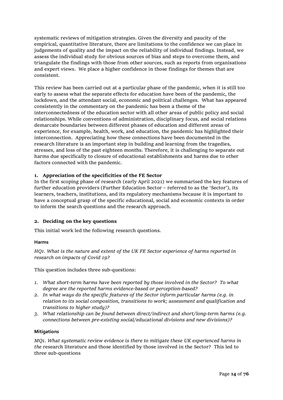
Page 14 of 76
systematic reviews of mitigation strategies. Given the diversity and paucity of the
empirical, quantitative literature, there are limitations to the confidence we can place in
judgements of quality and the impact on the reliability of individual findings. Instead, we
assess the individual study for obvious sources of bias and steps to overcome them, and
triangulate the findings with those from other sources, such as reports from organisations
and expert views. We place a higher confidence in those findings for themes that are
consistent.
This review has been carried out at a particular phase of the pandemic, when it is still too
early to assess what the separate effects for education have been of the pandemic, the
lockdown, and the attendant social, economic and political challenges. What has appeared
consistently in the commentary on the pandemic has been a theme of the
interconnectedness of the education sector with all other areas of public policy and social
relationships. While conventions of administration, disciplinary focus, and social relations
demarcate boundaries between different phases of education and different areas of
experience, for example, health, work, and education, the pandemic has highlighted their
interconnection. Appreciating how these connections have been documented in the
research literature is an important step in building and learning from the tragedies,
stresses, and loss of the past eighteen months. Therefore, it is challenging to separate out
harms due specifically to closure of educational establishments and harms due to other
factors connected with the pandemic.
1. Appreciation of the specificities of the FE Sector
In the first scoping phase of research (early April 2021) we summarised the key features of
further education providers (Further Education Sector - referred to as the 'Sector'), its
learners, teachers, institutions, and its regulatory mechanisms because it is important to
have a conceptual grasp of the specific educational, social and economic contexts in order
to inform the search questions and the research approach.
2. Deciding on the key questions
This initial work led the following research questions.
Harms
HQ1. What is the nature and extent of the UK FE Sector experience of harms reported in
research on impacts of Covid 19?
This question includes three sub-questions:
1. What short-term harms have been reported by those involved in the Sector? To what
degree are the reported harms evidence-based or perception-based?
2. In what ways do the specific features of the Sector inform particular harms (e.g. in
relation to its social composition, transitions to work; assessment and qualification and
transitions to higher study)?
3. What relationship can be found between direct/indirect and short/long-term harms (e.g.
connections between pre-existing social/educational divisions and new divisions)?
Mitigations
MQ1. What systematic review evidence is there to mitigate these UK experienced harms in
the research literature and those identified by those involved in the Sector? This led to
three sub-questions